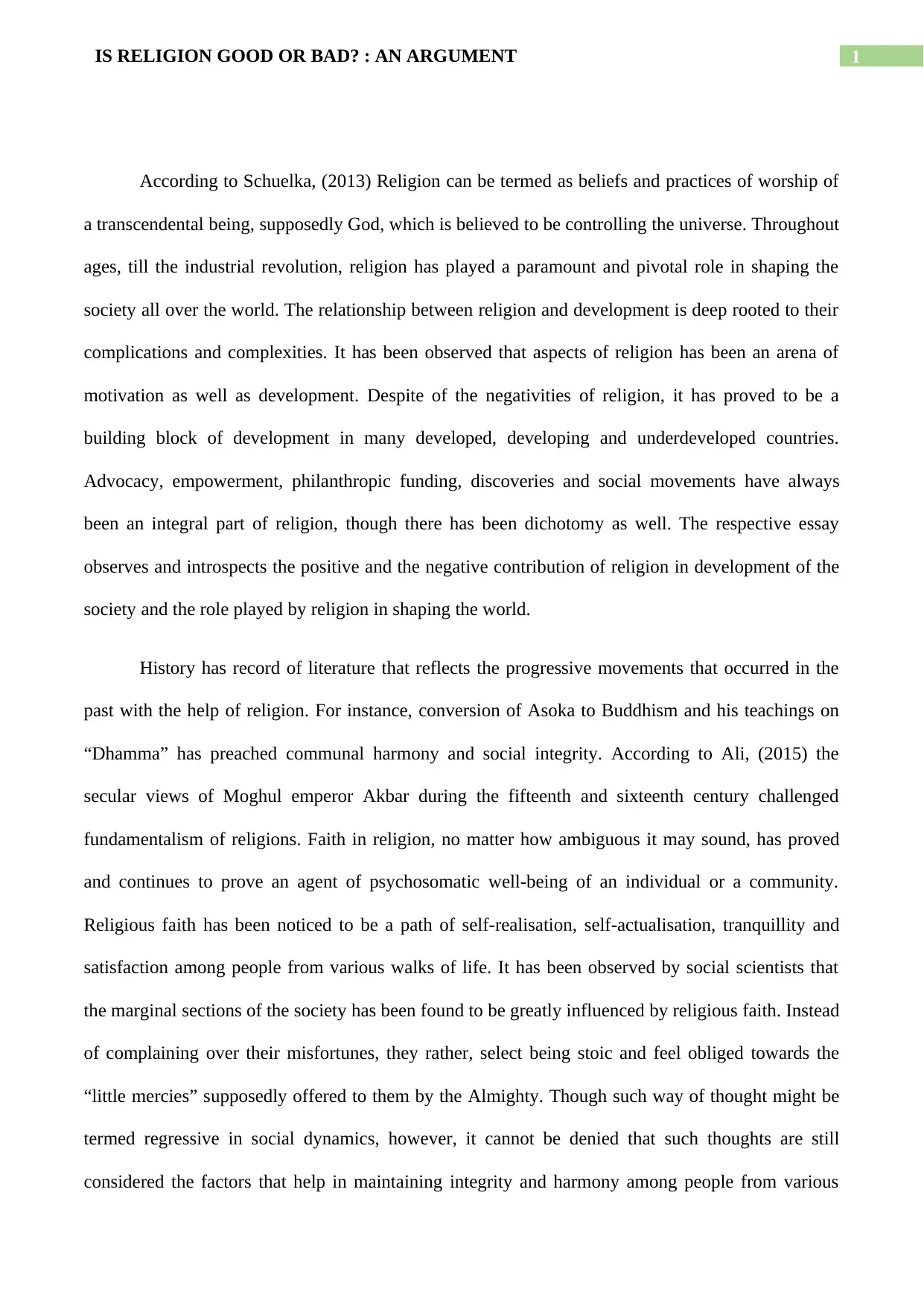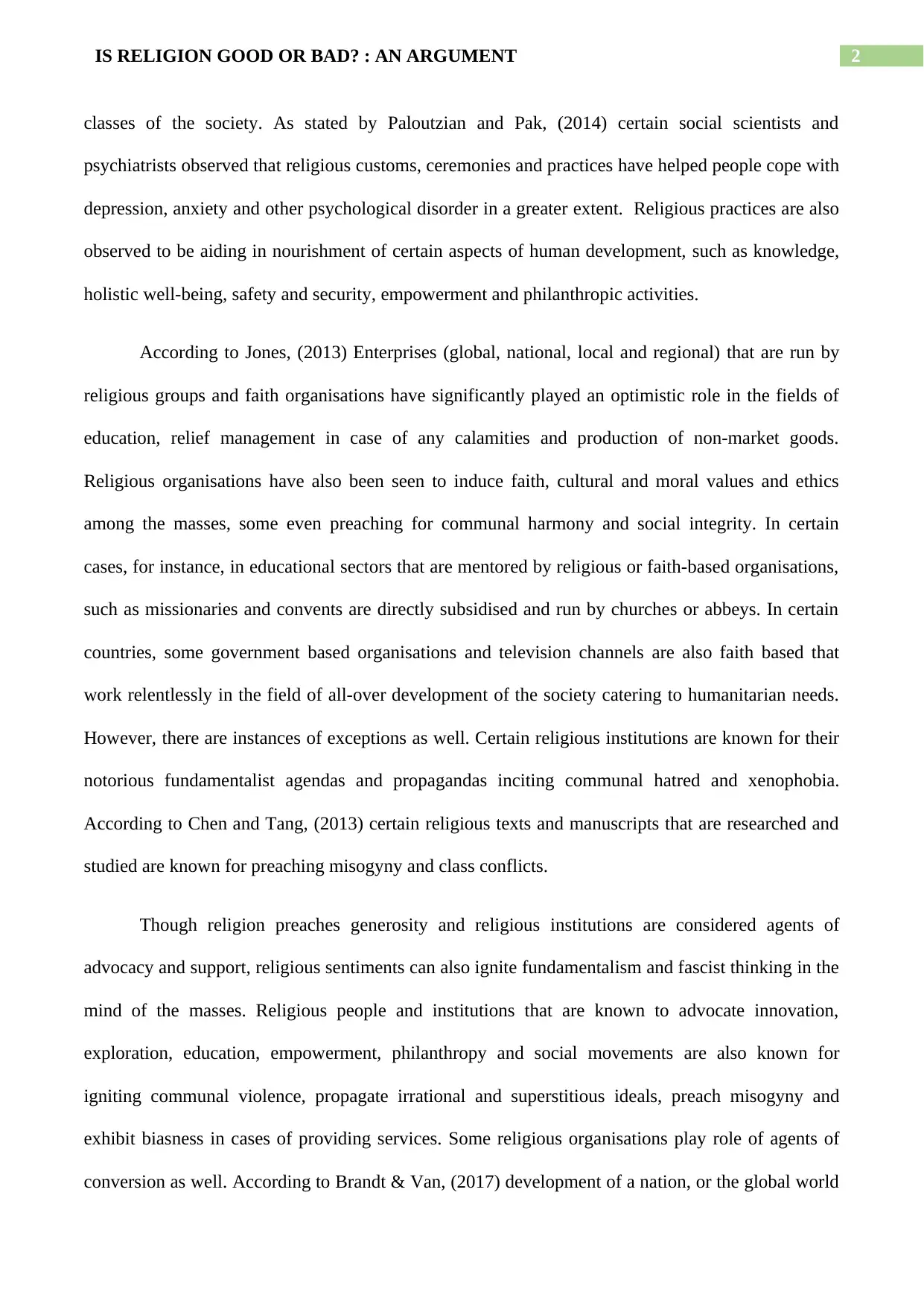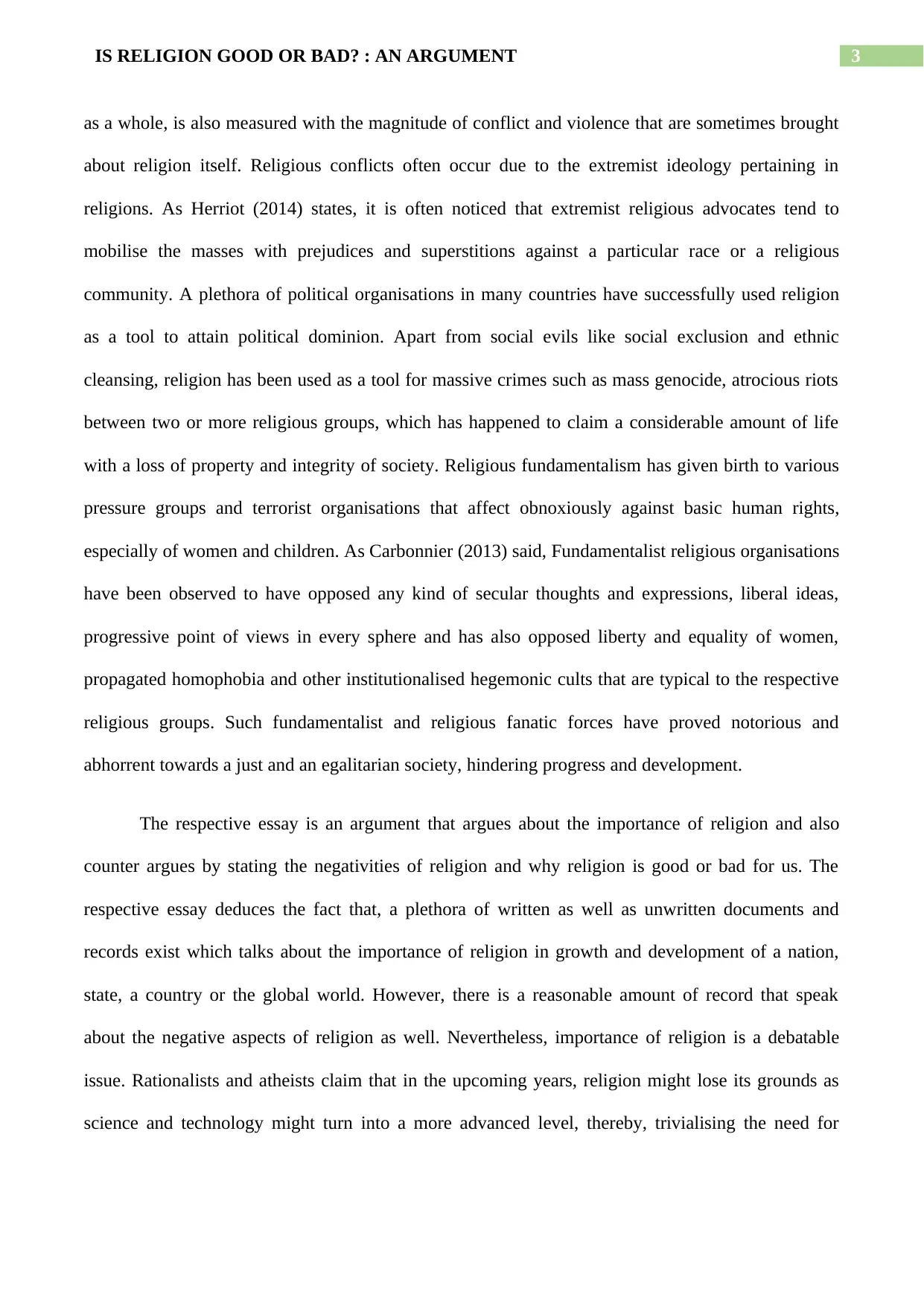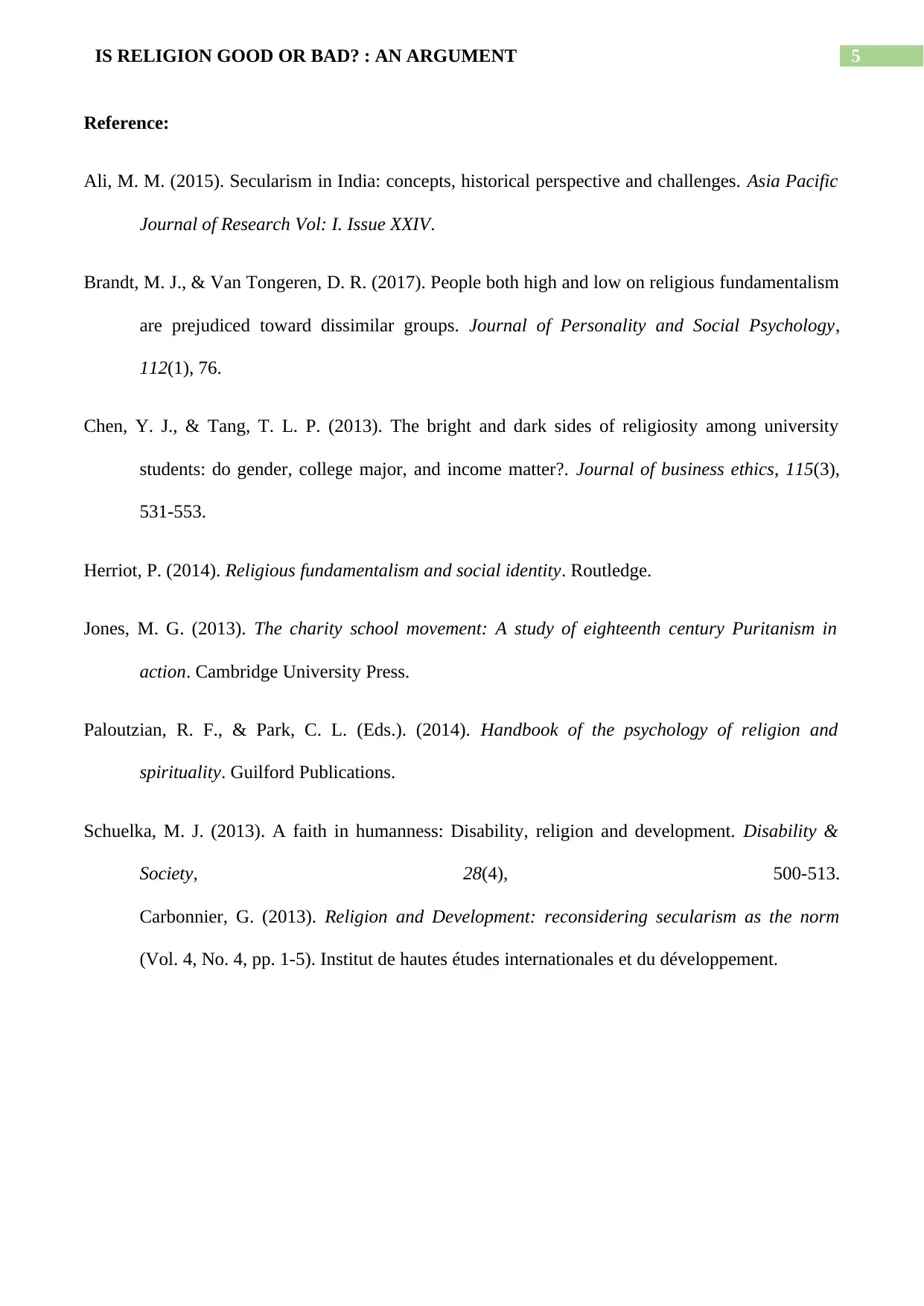IS RELIGION GOOD OR BAD? : AN ARGUMENT, World Religions Essay
VerifiedAdded on 2023/04/22
|6
|1555
|456
Essay
AI Summary
This essay presents an argument concerning the multifaceted impact of religion on society and individuals. It begins by defining religion and acknowledging its historical significance in shaping societies worldwide, emphasizing its role in motivation, development, and various social movements. The essay explores both the positive contributions of religion, such as promoting communal harmony, providing psychological well-being, and fostering philanthropic activities, and the negative aspects, including inciting fundamentalism, communal violence, and misogyny. The author argues that while religion has played a crucial role in human development, it also has the potential to instigate conflicts and promote social evils. The essay concludes by presenting a balanced perspective, acknowledging the ongoing debate about the significance of religion and its evolution within society, and acknowledging the opposing views of rationalists and atheists who question the continued importance of religion in the face of scientific and technological advancements.

Running head: IS RELIGION GOOD OR BAD? : AN ARGUMENT
IS RELIGION GOOD OR BAD? : AN ARGUMENT
Name of the student
Name of the university
Author Note
IS RELIGION GOOD OR BAD? : AN ARGUMENT
Name of the student
Name of the university
Author Note
Paraphrase This Document
Need a fresh take? Get an instant paraphrase of this document with our AI Paraphraser

1IS RELIGION GOOD OR BAD? : AN ARGUMENT
According to Schuelka, (2013) Religion can be termed as beliefs and practices of worship of
a transcendental being, supposedly God, which is believed to be controlling the universe. Throughout
ages, till the industrial revolution, religion has played a paramount and pivotal role in shaping the
society all over the world. The relationship between religion and development is deep rooted to their
complications and complexities. It has been observed that aspects of religion has been an arena of
motivation as well as development. Despite of the negativities of religion, it has proved to be a
building block of development in many developed, developing and underdeveloped countries.
Advocacy, empowerment, philanthropic funding, discoveries and social movements have always
been an integral part of religion, though there has been dichotomy as well. The respective essay
observes and introspects the positive and the negative contribution of religion in development of the
society and the role played by religion in shaping the world.
History has record of literature that reflects the progressive movements that occurred in the
past with the help of religion. For instance, conversion of Asoka to Buddhism and his teachings on
“Dhamma” has preached communal harmony and social integrity. According to Ali, (2015) the
secular views of Moghul emperor Akbar during the fifteenth and sixteenth century challenged
fundamentalism of religions. Faith in religion, no matter how ambiguous it may sound, has proved
and continues to prove an agent of psychosomatic well-being of an individual or a community.
Religious faith has been noticed to be a path of self-realisation, self-actualisation, tranquillity and
satisfaction among people from various walks of life. It has been observed by social scientists that
the marginal sections of the society has been found to be greatly influenced by religious faith. Instead
of complaining over their misfortunes, they rather, select being stoic and feel obliged towards the
“little mercies” supposedly offered to them by the Almighty. Though such way of thought might be
termed regressive in social dynamics, however, it cannot be denied that such thoughts are still
considered the factors that help in maintaining integrity and harmony among people from various
According to Schuelka, (2013) Religion can be termed as beliefs and practices of worship of
a transcendental being, supposedly God, which is believed to be controlling the universe. Throughout
ages, till the industrial revolution, religion has played a paramount and pivotal role in shaping the
society all over the world. The relationship between religion and development is deep rooted to their
complications and complexities. It has been observed that aspects of religion has been an arena of
motivation as well as development. Despite of the negativities of religion, it has proved to be a
building block of development in many developed, developing and underdeveloped countries.
Advocacy, empowerment, philanthropic funding, discoveries and social movements have always
been an integral part of religion, though there has been dichotomy as well. The respective essay
observes and introspects the positive and the negative contribution of religion in development of the
society and the role played by religion in shaping the world.
History has record of literature that reflects the progressive movements that occurred in the
past with the help of religion. For instance, conversion of Asoka to Buddhism and his teachings on
“Dhamma” has preached communal harmony and social integrity. According to Ali, (2015) the
secular views of Moghul emperor Akbar during the fifteenth and sixteenth century challenged
fundamentalism of religions. Faith in religion, no matter how ambiguous it may sound, has proved
and continues to prove an agent of psychosomatic well-being of an individual or a community.
Religious faith has been noticed to be a path of self-realisation, self-actualisation, tranquillity and
satisfaction among people from various walks of life. It has been observed by social scientists that
the marginal sections of the society has been found to be greatly influenced by religious faith. Instead
of complaining over their misfortunes, they rather, select being stoic and feel obliged towards the
“little mercies” supposedly offered to them by the Almighty. Though such way of thought might be
termed regressive in social dynamics, however, it cannot be denied that such thoughts are still
considered the factors that help in maintaining integrity and harmony among people from various

2IS RELIGION GOOD OR BAD? : AN ARGUMENT
classes of the society. As stated by Paloutzian and Pak, (2014) certain social scientists and
psychiatrists observed that religious customs, ceremonies and practices have helped people cope with
depression, anxiety and other psychological disorder in a greater extent. Religious practices are also
observed to be aiding in nourishment of certain aspects of human development, such as knowledge,
holistic well-being, safety and security, empowerment and philanthropic activities.
According to Jones, (2013) Enterprises (global, national, local and regional) that are run by
religious groups and faith organisations have significantly played an optimistic role in the fields of
education, relief management in case of any calamities and production of non-market goods.
Religious organisations have also been seen to induce faith, cultural and moral values and ethics
among the masses, some even preaching for communal harmony and social integrity. In certain
cases, for instance, in educational sectors that are mentored by religious or faith-based organisations,
such as missionaries and convents are directly subsidised and run by churches or abbeys. In certain
countries, some government based organisations and television channels are also faith based that
work relentlessly in the field of all-over development of the society catering to humanitarian needs.
However, there are instances of exceptions as well. Certain religious institutions are known for their
notorious fundamentalist agendas and propagandas inciting communal hatred and xenophobia.
According to Chen and Tang, (2013) certain religious texts and manuscripts that are researched and
studied are known for preaching misogyny and class conflicts.
Though religion preaches generosity and religious institutions are considered agents of
advocacy and support, religious sentiments can also ignite fundamentalism and fascist thinking in the
mind of the masses. Religious people and institutions that are known to advocate innovation,
exploration, education, empowerment, philanthropy and social movements are also known for
igniting communal violence, propagate irrational and superstitious ideals, preach misogyny and
exhibit biasness in cases of providing services. Some religious organisations play role of agents of
conversion as well. According to Brandt & Van, (2017) development of a nation, or the global world
classes of the society. As stated by Paloutzian and Pak, (2014) certain social scientists and
psychiatrists observed that religious customs, ceremonies and practices have helped people cope with
depression, anxiety and other psychological disorder in a greater extent. Religious practices are also
observed to be aiding in nourishment of certain aspects of human development, such as knowledge,
holistic well-being, safety and security, empowerment and philanthropic activities.
According to Jones, (2013) Enterprises (global, national, local and regional) that are run by
religious groups and faith organisations have significantly played an optimistic role in the fields of
education, relief management in case of any calamities and production of non-market goods.
Religious organisations have also been seen to induce faith, cultural and moral values and ethics
among the masses, some even preaching for communal harmony and social integrity. In certain
cases, for instance, in educational sectors that are mentored by religious or faith-based organisations,
such as missionaries and convents are directly subsidised and run by churches or abbeys. In certain
countries, some government based organisations and television channels are also faith based that
work relentlessly in the field of all-over development of the society catering to humanitarian needs.
However, there are instances of exceptions as well. Certain religious institutions are known for their
notorious fundamentalist agendas and propagandas inciting communal hatred and xenophobia.
According to Chen and Tang, (2013) certain religious texts and manuscripts that are researched and
studied are known for preaching misogyny and class conflicts.
Though religion preaches generosity and religious institutions are considered agents of
advocacy and support, religious sentiments can also ignite fundamentalism and fascist thinking in the
mind of the masses. Religious people and institutions that are known to advocate innovation,
exploration, education, empowerment, philanthropy and social movements are also known for
igniting communal violence, propagate irrational and superstitious ideals, preach misogyny and
exhibit biasness in cases of providing services. Some religious organisations play role of agents of
conversion as well. According to Brandt & Van, (2017) development of a nation, or the global world
⊘ This is a preview!⊘
Do you want full access?
Subscribe today to unlock all pages.

Trusted by 1+ million students worldwide

3IS RELIGION GOOD OR BAD? : AN ARGUMENT
as a whole, is also measured with the magnitude of conflict and violence that are sometimes brought
about religion itself. Religious conflicts often occur due to the extremist ideology pertaining in
religions. As Herriot (2014) states, it is often noticed that extremist religious advocates tend to
mobilise the masses with prejudices and superstitions against a particular race or a religious
community. A plethora of political organisations in many countries have successfully used religion
as a tool to attain political dominion. Apart from social evils like social exclusion and ethnic
cleansing, religion has been used as a tool for massive crimes such as mass genocide, atrocious riots
between two or more religious groups, which has happened to claim a considerable amount of life
with a loss of property and integrity of society. Religious fundamentalism has given birth to various
pressure groups and terrorist organisations that affect obnoxiously against basic human rights,
especially of women and children. As Carbonnier (2013) said, Fundamentalist religious organisations
have been observed to have opposed any kind of secular thoughts and expressions, liberal ideas,
progressive point of views in every sphere and has also opposed liberty and equality of women,
propagated homophobia and other institutionalised hegemonic cults that are typical to the respective
religious groups. Such fundamentalist and religious fanatic forces have proved notorious and
abhorrent towards a just and an egalitarian society, hindering progress and development.
The respective essay is an argument that argues about the importance of religion and also
counter argues by stating the negativities of religion and why religion is good or bad for us. The
respective essay deduces the fact that, a plethora of written as well as unwritten documents and
records exist which talks about the importance of religion in growth and development of a nation,
state, a country or the global world. However, there is a reasonable amount of record that speak
about the negative aspects of religion as well. Nevertheless, importance of religion is a debatable
issue. Rationalists and atheists claim that in the upcoming years, religion might lose its grounds as
science and technology might turn into a more advanced level, thereby, trivialising the need for
as a whole, is also measured with the magnitude of conflict and violence that are sometimes brought
about religion itself. Religious conflicts often occur due to the extremist ideology pertaining in
religions. As Herriot (2014) states, it is often noticed that extremist religious advocates tend to
mobilise the masses with prejudices and superstitions against a particular race or a religious
community. A plethora of political organisations in many countries have successfully used religion
as a tool to attain political dominion. Apart from social evils like social exclusion and ethnic
cleansing, religion has been used as a tool for massive crimes such as mass genocide, atrocious riots
between two or more religious groups, which has happened to claim a considerable amount of life
with a loss of property and integrity of society. Religious fundamentalism has given birth to various
pressure groups and terrorist organisations that affect obnoxiously against basic human rights,
especially of women and children. As Carbonnier (2013) said, Fundamentalist religious organisations
have been observed to have opposed any kind of secular thoughts and expressions, liberal ideas,
progressive point of views in every sphere and has also opposed liberty and equality of women,
propagated homophobia and other institutionalised hegemonic cults that are typical to the respective
religious groups. Such fundamentalist and religious fanatic forces have proved notorious and
abhorrent towards a just and an egalitarian society, hindering progress and development.
The respective essay is an argument that argues about the importance of religion and also
counter argues by stating the negativities of religion and why religion is good or bad for us. The
respective essay deduces the fact that, a plethora of written as well as unwritten documents and
records exist which talks about the importance of religion in growth and development of a nation,
state, a country or the global world. However, there is a reasonable amount of record that speak
about the negative aspects of religion as well. Nevertheless, importance of religion is a debatable
issue. Rationalists and atheists claim that in the upcoming years, religion might lose its grounds as
science and technology might turn into a more advanced level, thereby, trivialising the need for
Paraphrase This Document
Need a fresh take? Get an instant paraphrase of this document with our AI Paraphraser

4IS RELIGION GOOD OR BAD? : AN ARGUMENT
worship of a transcendental. The respective matter is controversial as many social scientists believe
that religion is dynamic and evolves according to the choices and preferences of the society.
worship of a transcendental. The respective matter is controversial as many social scientists believe
that religion is dynamic and evolves according to the choices and preferences of the society.

5IS RELIGION GOOD OR BAD? : AN ARGUMENT
Reference:
Ali, M. M. (2015). Secularism in India: concepts, historical perspective and challenges. Asia Pacific
Journal of Research Vol: I. Issue XXIV.
Brandt, M. J., & Van Tongeren, D. R. (2017). People both high and low on religious fundamentalism
are prejudiced toward dissimilar groups. Journal of Personality and Social Psychology,
112(1), 76.
Chen, Y. J., & Tang, T. L. P. (2013). The bright and dark sides of religiosity among university
students: do gender, college major, and income matter?. Journal of business ethics, 115(3),
531-553.
Herriot, P. (2014). Religious fundamentalism and social identity. Routledge.
Jones, M. G. (2013). The charity school movement: A study of eighteenth century Puritanism in
action. Cambridge University Press.
Paloutzian, R. F., & Park, C. L. (Eds.). (2014). Handbook of the psychology of religion and
spirituality. Guilford Publications.
Schuelka, M. J. (2013). A faith in humanness: Disability, religion and development. Disability &
Society, 28(4), 500-513.
Carbonnier, G. (2013). Religion and Development: reconsidering secularism as the norm
(Vol. 4, No. 4, pp. 1-5). Institut de hautes études internationales et du développement.
Reference:
Ali, M. M. (2015). Secularism in India: concepts, historical perspective and challenges. Asia Pacific
Journal of Research Vol: I. Issue XXIV.
Brandt, M. J., & Van Tongeren, D. R. (2017). People both high and low on religious fundamentalism
are prejudiced toward dissimilar groups. Journal of Personality and Social Psychology,
112(1), 76.
Chen, Y. J., & Tang, T. L. P. (2013). The bright and dark sides of religiosity among university
students: do gender, college major, and income matter?. Journal of business ethics, 115(3),
531-553.
Herriot, P. (2014). Religious fundamentalism and social identity. Routledge.
Jones, M. G. (2013). The charity school movement: A study of eighteenth century Puritanism in
action. Cambridge University Press.
Paloutzian, R. F., & Park, C. L. (Eds.). (2014). Handbook of the psychology of religion and
spirituality. Guilford Publications.
Schuelka, M. J. (2013). A faith in humanness: Disability, religion and development. Disability &
Society, 28(4), 500-513.
Carbonnier, G. (2013). Religion and Development: reconsidering secularism as the norm
(Vol. 4, No. 4, pp. 1-5). Institut de hautes études internationales et du développement.
⊘ This is a preview!⊘
Do you want full access?
Subscribe today to unlock all pages.

Trusted by 1+ million students worldwide
1 out of 6
Related Documents
Your All-in-One AI-Powered Toolkit for Academic Success.
+13062052269
info@desklib.com
Available 24*7 on WhatsApp / Email
![[object Object]](/_next/static/media/star-bottom.7253800d.svg)
Unlock your academic potential
Copyright © 2020–2025 A2Z Services. All Rights Reserved. Developed and managed by ZUCOL.




